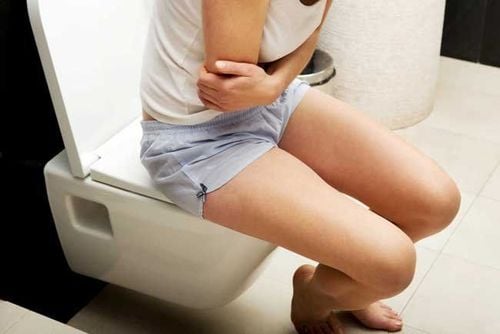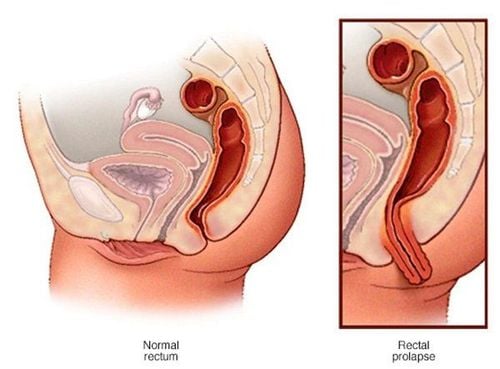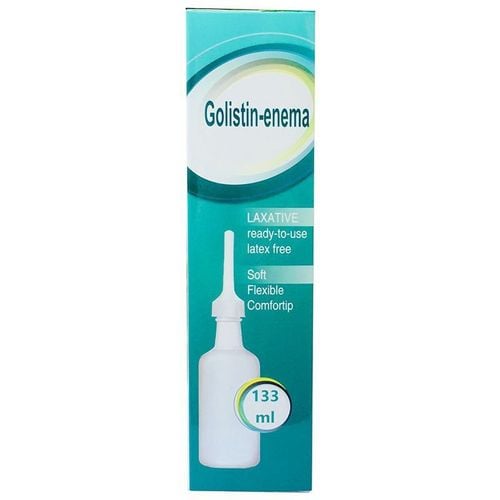This is an automatically translated article.
The article was professionally consulted by MSc Vu Van Quan - Department of General Surgery & Anesthesia - Vinmec Hai Phong International General Hospital.Rectal prolapse causes rectal bleeding, loss of bowel control, affecting the patient's health and daily activities. Surgery is the mainstay of treatment for patients with rectal prolapse. In which, laparoscopic fixation of the rectum is a minimally invasive technique with many outstanding advantages.
1. What is rectal prolapse?
The rectum is the last part of the large intestine and is where stool is stored before it is passed. Rectal prolapse is a condition in which part of the rectum protrudes from the anus. This is a benign disease that does not leave many dangerous complications but causes many inconveniences in daily activities and adversely affects quality of life. Besides, if the prolapse is stuck outside the anus, it can cause strangulation and risk necrosis.
There are 3 types of rectal prolapse:
Prolapse of the anal mucosa: Only the anal mucosa prolapses, although the rectum is pulled down by the anus, it is still inside. Rectal prolapse: Only the rectum prolapses, the anus remains in its original position, creating a deep circular groove between the anus and the rectum. Anal prolapse: Rectal prolapse pulls the anus, between the anus and rectum there is no circular groove.
2. Diagnosis of rectal prolapse
To diagnose rectal prolapse, the doctor will review the patient's history, ask them about symptoms, and perform an anorectal exam.
Diagnostic imaging can be specified as:
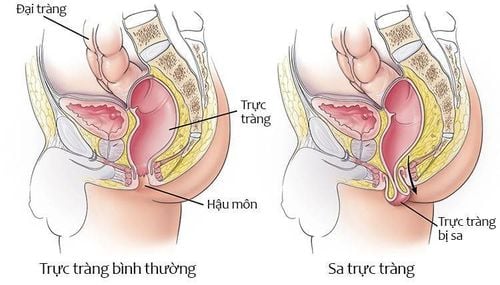
Sa trực tràng không gây biến chứng nguy hiểm nhưng gây ra nhiều bất tiện cho người bệnh
Colonoscopy or contrast-enhanced colonoscopy to rule out malignancy associated with Defecography is not necessary in patients with total rectal wall prolapse, but is a good means of detecting and evaluating cases of mass. prolapse does not come out of the anus (internal prolapse, intussusception) or detect other pathologies rectocele, enterocele, cystocele. Colonic transit time: Detection of concomitant chronic colonic inertia in constipated rectal prolapse patients.
3. Treatment of rectal prolapse
Surgery is the main treatment modality for patients with rectal prolapse. There are two main surgical approaches: transabdominal and transpelvic surgery. Depends on factors: age, sex, co-existing diseases, bowel disorders of the patient and experience of the surgeon.
In trans-abdominal surgery, laparoscopic surgery results in complications and recurrence comparable to open surgery, but has many outstanding advantages. Laparoscopic surgery is surgery through small 5-10mm incisions through which the surgeon places a camera and surgical instruments, allowing them to perform the surgery described above for surgery with a laparoscopic approach. abdominal line.
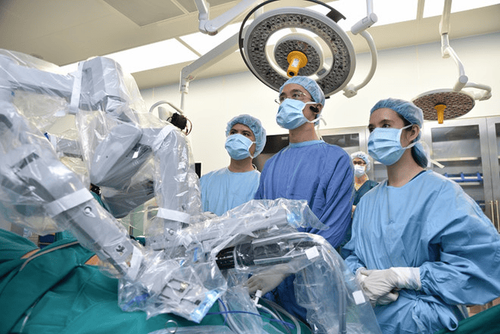
Điều trị sa trực tràng tại Bệnh viện Đa khoa Quốc tế Vinmec
4. Advantages of laparoscopic surgery for rectal prolapse
Compared with classic open surgery, laparoscopic surgery has many outstanding advantages:
Less pain after surgery Small surgical scars. Minimize the risk of wound infection. Guaranteed aesthetics. Quick recovery after surgery, short hospital stay 1-2 days. Quickly return to normal activities.
5. Treatment of rectal prolapse by laparoscopic surgery at Vinmec Hai Phong General Hospital
Laparoscopic surgery for adult rectal prolapse includes dissection to release the rectum, fixation to the protrusion by direct sutures (Orr-Loygue method) or improved techniques (using Ivalon, Teflon pads, etc.) ... mediate, fix the rectum to the protrusion, anterior sacral fascia). This method is applied in most developed countries in the world. In Vietnam, laparoscopic colectomy is applied in most surgical centers in developed countries and Vinmec Health System. Performed by Master, Doctor Vu Van Quan - Doctor specializing in the examination and treatment of surgical pathologies of the gastrointestinal tract, including colon and diseases of the peritoneal cavity, abdominal wall. With his extensive practical experience, the doctor has directly conducted many successful endoscopic gastrointestinal surgery in general and right colonectomy in particular. Laparoscopic surgery is indicated in the following cases: Total rectal prolapse in adults, the prolapsed bowel is not necrotic. Contraindications: The prolapsed intestine has been necrotic or the patient's condition does not allow laparoscopic surgery.
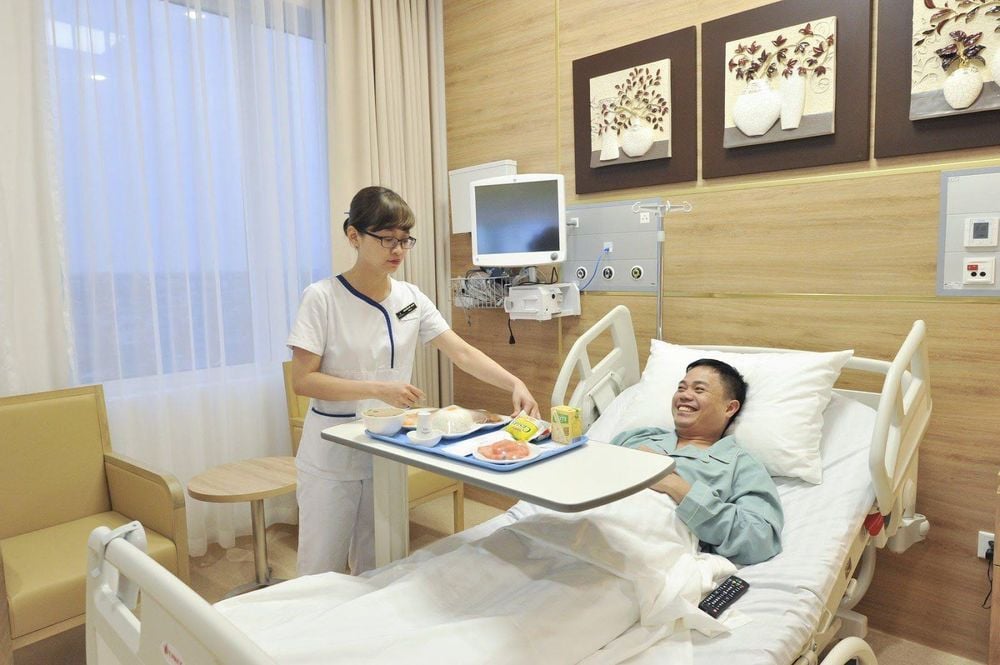
Bệnh nhân được chăm sóc sau điều trị sa trực tràng tại Vinmec.
Normal manifestations after surgery After surgery, the patient is monitored for 1-2 days, the health condition improves and can be discharged immediately. If there are unusual signs such as severe abdominal pain, gastrointestinal disorders (vomiting, diarrhea, bloody stools) or fever, the doctor must be re-examined immediately.
Vinmec Hai Phong International General Hospital has been and is a reliable choice in the treatment of rectal prolapse by laparoscopic fixed rectal surgery. Vinmec with a team of experienced experts and full modern equipment helps accurately diagnose the cause of rectal prolapse and many other anal and rectal diseases, thereby providing treatment solutions. optimal, providing superior care for patients.
Master. Doctor. Vu Van Quan has more than 10 years of experience working in the field of General Gastroenterology, specializing in examining and treating surgical pathologies of the gastrointestinal tract, liver, bile, pancreas and diseases of the abdominal peritoneum and abdominal wall.
Customers can directly go to Vinmec Health system nationwide to visit or contact the hotline here for support.






